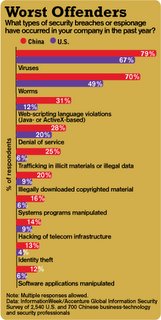IT Security in China shows cracks
 As businesses move aggressively into the burgeoning Chinese market, they had better investigate the level of IT security in place among the local companies that could become their customers and business partners.
As businesses move aggressively into the burgeoning Chinese market, they had better investigate the level of IT security in place among the local companies that could become their customers and business partners.Chinese companies, it turns out, are getting hit by more computer-system attacks than their U.S. counterparts--and they're less prepared for many of the threats coming their way. For anyone who thinks computer-system security in the United States is worrisome, consider the plight of Chinese companies: They suffer more viruses, worms, denial-of-service attacks, and identity theft than U.S. companies. And they face the onslaught on limited budgets with fewer protections in place.
Chinese companies have a lot of catching up to do, and they know it. Survey respondents in China are anxious about the situation. Nearly half (46%) believe their companies are more vulnerable to malicious code attacks and security breaches than a year ago. They cite the increasing sophistication of threats, the diversity of attacks, and sheer volume as top reasons for growing susceptibility. Many Chinese companies have yet to implement carefully crafted security procedures or strategies. Among respondents reporting that their companies have become more or equally vulnerable to threats in the past year, 49% blame their susceptibility on the lack of an information-security strategy, 42% point to outmoded IT architecture, and 26% report inadequate software-patching procedures. Complexity (55%), user awareness (53%), and budget constraints (30%) are their biggest challenges.
These are the findings of InformationWeek Research's 2005 Global Information Security Survey, conducted online in September in conjunction with management consulting firm Accenture.
RELATED TOPICS:
We have warned of the importance of scrutinising security issues associated with outsourcing/collaboration/offshoring in previous posts:
Gartner warns of offshore security risk
Security when outsourcing offshore
India to tighten data security laws
CATEGORIES: 1survey, 1outsourcing, 1collaboration, 1offshoring, 1stats

0 Comments:
Post a Comment
<< Home